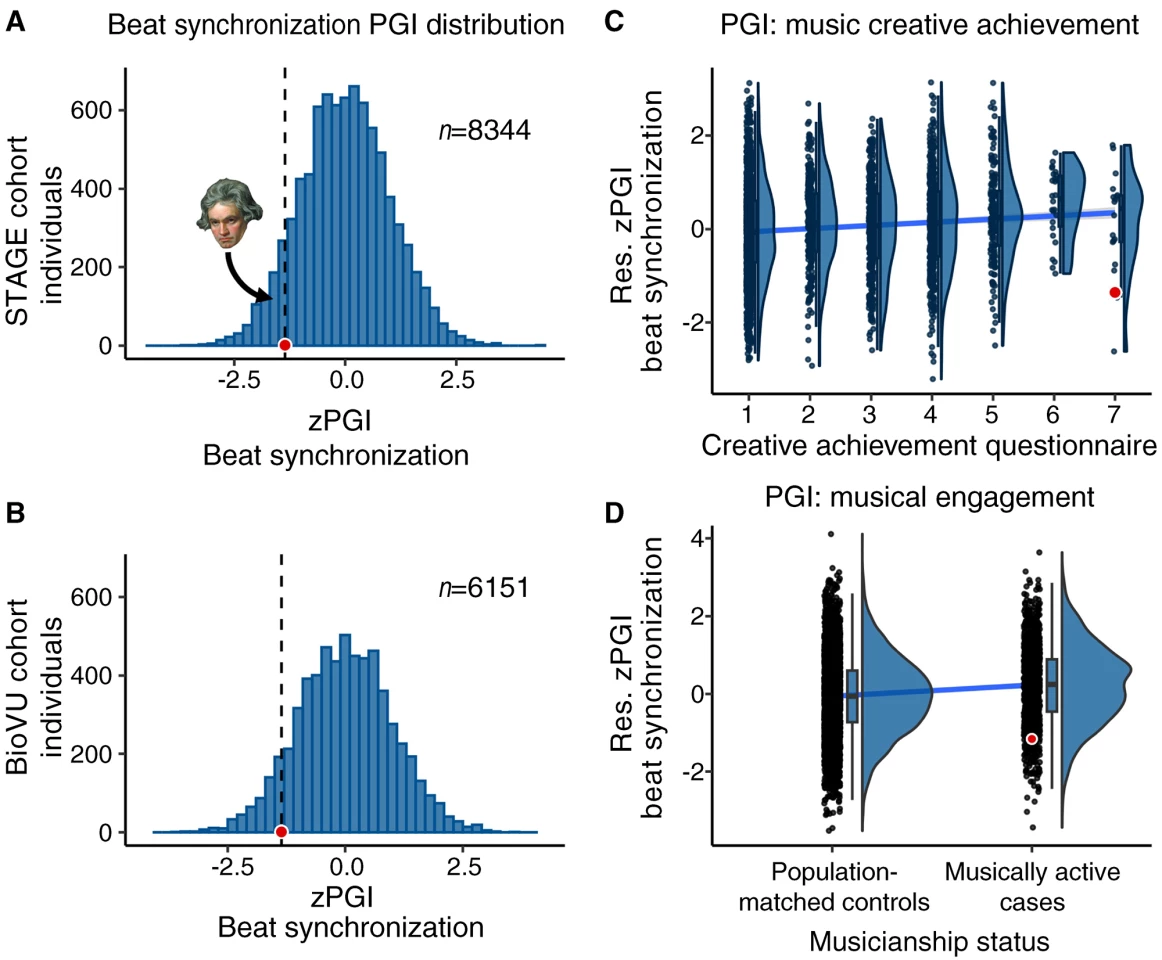Analysis of Beethoven’s DNA has revealed that he had a low genetic predisposition for beat synchronization, an ability that’s closely related to musicality. This is according to researchers who set out to show how making genetic predictions for individuals, including famous historical figures, can be fraught with danger.
Advances in DNA sequencing statistical methods for understanding the genetic basis of human traits and diseases have enabled scientists to investigate the genomic makeup of prominent historical figures. Ludwig van Beethoven, one of the most influential and popular classical music composers, was recently the subject of genomic analysis that uncovered a predisposition for liver disease and infection with hepatitis B.
Now, a team of international researchers have analyzed Beethoven’s DNA to determine how much of the composer’s musical genius is attributable to genetics.
The first genomic analysis of Beethoven’s DNA, focused on possible genetic predispositions to his health, didn’t investigate the composer’s most famed traits because, at the time, there wasn’t an informative genome-wide association study (GWAS) of musical talent. However, a subsequent GWAS involving 606,825 individuals identified the specific locations (loci) of 69 genes significantly associated with beat synchronization ability, assessed by the question: Can you clap in time with a musical beat? A follow-up family study showed that polygenic indices had a small but significant effect on several music-related skills and traits.
Polygenic indices (PGIs) or a polygenic score (PGS) is a number that summarizes the estimated effect of many – hence, ‘poly’ – genetic variants on the physical manifestation of an individual’s genes. In the current study, the researchers calculated Beethoven's PGI and compared it with two population-based datasets of thousands of modern-day individuals for whom they had musical achievement data.
“For Beethoven, we used his recently sequenced DNA to calculate a polygenic score as an indicator for his genetic predisposition for beat synchronization,” said Tara Henechowicz, a recent visiting graduate student with Vanderbilt University’s Human Genetics Program and the study’s second author. “Interestingly, Beethoven, one of the most celebrated musicians in history, had an unremarkable polygenic score for general musicality compared to population samples from the Karolinska Institute in Sweden and Vanderbilt’s BioVU repository.”
Indeed, Beethoven’s PGI was relatively low compared with both reference populations, placing him in the ninth percentile for the Swedish (STAGE) cohort and the 11th percentile for BioVU, represented by the black dashed line and red dot in the image below. To clarify, being in the ninth percentile means that 9% of people are below you and 91% are above you.

The study distinctly highlights the challenges of the PGI approach. As the researchers noted, it would be obviously wrong to conclude that Beethoven’s low PGI meant he was an unexceptional musician, given his renown as a virtuoso. Further, they said the same applies to current, real-world estimations of musical talent.
“Our aim was to use this as an example of the challenges of making genetic predictions for an individual who lived over 200 years ago,” Henechowicz said. “The mismatch between the DNA-based prediction and Beethoven’s musical genius provides a valuable teaching moment, because it demonstrates that DNA tests cannot give us a definitive answer about whether a given child will end up being musically gifted.”
However, the findings don’t discount DNA's contribution to musical talent, either. A previous twin study found that individual differences in music-related traits have a considerable genetic basis, with an average heritability of 42%.
“In the current era of ‘big data’ such as Vanderbilt’s BioVU repository, we have had the opportunity to look in fine detail at large groups of people to uncover the genetic underpinnings of traits such as rhythm ability or being musically active,” said Reyna Gordon, a study co-author. “The current study and other recent work also suggests that environment plays a key role in musical ability and engagement as well.”
The researchers point out that a typical PGI “captures just a fraction of genetic effects” and is heavily reliant on the statistical power of the GWAS and the heritability of the target trait. The predictive value of PGIs improves with larger GWAS samples and for traits with higher heritability. Genetic associations also reflect a culture-specific interplay between genetics and environment. So, a GWAS in Western society may not universally apply to other populations. Additionally, PGIs don’t necessarily produce accurate predictions at the individual level.
“Polygenic scores are intended to work well for comparisons of large groups of people to tell us how genetic risk for one trait relates to the genetics involved in other traits,” said Henechowicz.
The researchers advise exercising caution when using PGIs to assign individual-level predictive value, including for famous historical figures.
The study was published in the journal Current Biology.






